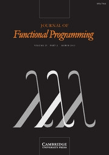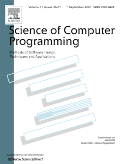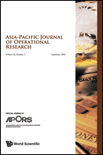
JOURNAL OF FUNCTIONAL PROGRAMMING
Scope & Guideline
Exploring Innovative Horizons in Functional Programming
Introduction
Aims and Scopes
- Functional Programming Semantics:
The journal emphasizes the formal semantics of functional programming languages, exploring how to define and reason about the behavior of programs through methodologies such as operational and denotational semantics. - Type Systems and Type Theory:
A significant focus is on advanced type systems, including gradual typing, polymorphism, and dependent types, which enhance the expressiveness and safety of functional programming languages. - Programming Language Design and Implementation:
Research that contributes to the design and implementation of functional programming languages is central, including language features, compilers, and runtime systems. - Algebraic Effects and Handlers:
There is a growing interest in algebraic effects and handlers as a means to manage side effects in functional programming, allowing for more modular and composable code. - Program Verification and Certification:
The journal promotes research on program verification, including proof techniques and tools that ensure program correctness, which is vital for building reliable software. - Domain-Specific Languages (DSLs):
Papers on the creation and use of DSLs tailored for specific applications or domains provide insights into how functional programming can be applied effectively across various fields.
Trending and Emerging
- Gradual Typing:
There is an increasing focus on gradual typing, which allows for a more flexible approach to type systems, facilitating the integration of dynamic and static typing, thus appealing to a broader audience of programmers. - Effect Handlers and Algebraic Effects:
Research on effect handlers is gaining traction as a method for managing side effects in functional programming, offering new ways to structure code and improve modularity. - Verified Programming and Secure Compilation:
The trend towards verified programming and secure compilation is on the rise, highlighting the need for reliability and security in software development, which is crucial in today's technology landscape. - Functional Reactive Programming (FRP):
The exploration of functional reactive programming is emerging, especially concerning its application in building responsive and interactive systems without the overhead of traditional state management. - Domain-Specific Language Development:
The trend towards developing DSLs is becoming more prominent, showcasing the versatility of functional programming in addressing specific domain challenges effectively.
Declining or Waning
- Basic Functional Programming Techniques:
There is a noticeable reduction in fundamental papers focusing solely on introductory functional programming techniques, suggesting that the community is moving towards more advanced topics. - Imperative Programming Comparisons:
Research comparing functional programming with imperative paradigms has decreased, possibly reflecting a consensus on the benefits of functional programming rather than a need for comparative studies. - Traditional Algorithm Analysis:
Papers focused on traditional algorithmic techniques without a functional programming lens appear to be waning, indicating a shift towards more innovative approaches within the functional paradigm.
Similar Journals

JOURNAL OF AUTOMATED REASONING
Elevating Knowledge in AI and MathematicsJOURNAL OF AUTOMATED REASONING is a premier academic journal published by SPRINGER, focusing on the dynamic and evolving fields of Artificial Intelligence, Computational Theory and Mathematics, and Software. With an ISSN of 0168-7433 and E-ISSN 1573-0670, this journal ranks impressively in the second quartile (Q2) across multiple categories, reflecting its significant contribution to the advancement of knowledge in automated reasoning methodologies. Since its inception in 1985, it has served as a vital platform for researchers and professionals to share groundbreaking findings and innovative techniques, facilitating the exploration of algorithms, logical frameworks, and reasoning processes that underpin artificial intelligence systems. Although it does not currently offer Open Access options, it remains a highly regarded resource, cited widely in academia, with its impactful publications reflecting deep insights and rigorous scholarly standards. The journal’s esteemed status and its ongoing commitment to fostering a greater understanding of automated reasoning make it an invaluable asset for those dedicated to pushing the boundaries of these interdisciplinary fields.

PROGRAMMING AND COMPUTER SOFTWARE
Elevating the Standards of Programming Knowledge Since 1978PROGRAMMING AND COMPUTER SOFTWARE is a distinguished journal committed to advancing the field of software development and programming methodologies. Published by PLEIADES PUBLISHING INC, this journal has been a valuable resource since its inception in 1978, reaching out to researchers, professionals, and students alike. With an emphasis on rigorous peer-reviewed articles, the journal holds a Q3 ranking in the realm of Software according to the latest 2023 Category Quartiles. Though it does not offer open access, the journal ensures that high-quality research is disseminated to its audience, providing insights into evolving programming techniques, software engineering challenges, and innovative solutions. With its convergence of years extending to 2024, PROGRAMMING AND COMPUTER SOFTWARE remains a pivotal publication, fostering a deeper understanding of the complexities in computer programming while supporting the broader software community.

SCIENCE OF COMPUTER PROGRAMMING
Transforming Ideas into Computational ExcellenceScience of Computer Programming, published by Elsevier, is a leading journal dedicated to advancing knowledge in the fields of computer programming, computational theory, and software development. With a focus on interdisciplinary research that spans computational methodologies, information systems, and simulation modeling, this journal plays a vital role in disseminating innovative findings and fostering collaboration among experts in these dynamic areas. With a respectable impact factor and ranked in various Scopus Categories such as computational theory (Q3) and information systems (Q2), it provides a platform for high-quality scholarly articles that push the boundaries of programming science. Although currently not open access, the journal offers invaluable insights for researchers, professionals, and students alike, ensuring they are equipped with the latest advancements and methodologies to thrive in an ever-evolving technological landscape. The journal covers research from its convergence starting in 1981 and continues to welcome groundbreaking contributions as it looks forward to an exciting future through 2025 and beyond.

CONSTRAINTS
Exploring the Boundaries of Knowledge in AI and MathematicsCONSTRAINTS, an esteemed journal published by Springer, specializes in the interrelated domains of Artificial Intelligence, Computational Theory and Mathematics, Discrete Mathematics and Combinatorics, and Software. With an ISSN of 1383-7133 and E-ISSN of 1572-9354, this journal provides a critical platform for disseminating cutting-edge research and methodologies aimed at addressing complex challenges in these rapidly evolving fields. Located in the Netherlands, the journal's rigorous selection process is reflected in its impressive categorizations, achieving Q2 and Q3 rankings in various Scopus categories for 2023. This positions it among the top quartiles in its respective fields, making it a vital resource for scholars and practitioners seeking to stay at the forefront of innovation. Researchers and students alike will benefit from the insightful contributions within its pages, making CONSTRAINTS a pivotal journal for those dedicated to advancing knowledge and application in computational and artificial intelligence spheres.

Bulletin of the South Ural State University Series-Mathematical Modelling Programming & Computer Software
Shaping the Future of Mathematical Programming and SoftwareThe Bulletin of the South Ural State University Series-Mathematical Modelling Programming & Computer Software is a distinguished academic journal focusing on the interdisciplinary fields of mathematical modeling, programming, and software development. Published by the SOUTH URAL STATE UNIVERSITY, SCIENTIFIC RESEARCH DEPARTMENT, this journal serves as a platform for the dissemination of innovative research findings, methodologies, and applications in computational mathematics and related disciplines. With its ISSN 2071-0216 and E-ISSN 2308-0256, it has garnered attention within the research community, reflected in its rankings within the Q4 quartile across multiple categories in 2023, including Computational Mathematics and Software. Although it operates under an open access model, the journal emphasizes the importance of high-quality, peer-reviewed content to advance research education and practice in the Russian Federation and beyond. Researchers, professionals, and students are encouraged to contribute and access valuable insights, fostering collaboration among disciplines spanning mathematical theory, computational methods, and software development.

Genetic Programming and Evolvable Machines
Transforming Ideas into Intelligent SolutionsGenetic Programming and Evolvable Machines, published by SPRINGER, is a leading journal dedicated to the fields of genetic algorithms, evolutionary computation, and machine learning. With an ISSN of 1389-2576 and an E-ISSN of 1573-7632, this esteemed journal encompasses original research articles, reviews, and applications that explore the intricate relationships between intelligent systems and evolutionary processes. As of 2023, it holds a notable Q2 ranking in various categories including Computer Science Applications and Hardware and Architecture, reflecting its significant impact in advancing knowledge and methodologies within these domains. The journal's metrics, including a top rank of #31/130 in Theoretical Computer Science, signify its relevance and contribution to the broader academic community. Though not open access, papers published in the journal continue to serve as critical resources for both researchers and practitioners, promoting innovative methodologies and solutions. Covering a broad scope with a convergence extending from 2003 to 2024, this journal remains a pivotal platform for sharing cutting-edge research that shapes the future of artificial intelligence and computational theory.

Proceedings of the ACM on Programming Languages-PACMPL
Transforming the Landscape of Programming Language Research.Proceedings of the ACM on Programming Languages (PACMPL) is a premier journal that focuses on the advancement and dissemination of knowledge in the field of programming languages. Published by the Association for Computing Machinery (ACM), this rigorous journal serves as a vital platform for researchers, professionals, and students alike, contributing significantly to software development and safety across diverse applications. With impressive rankings in Q1 quartiles for both Safety, Risk, Reliability and Quality and Software, and a recognition in the Scopus Rankings, PACMPL stands out as a critical resource for cutting-edge research. The journal is particularly relevant in today’s rapidly evolving technological landscape, focusing on innovative practices and methodologies in programming languages that enhance system reliability and performance. As an Open Access publication since its convergence in 2017, PACMPL not only emphasizes high-quality peer-reviewed research but also prioritizes accessibility, making significant contributions to the global knowledge base. By empowering researchers and practitioners with the latest findings and trends, PACMPL continues to firmly establish its importance in the computing field.

ASIA-PACIFIC JOURNAL OF OPERATIONAL RESEARCH
Bridging Theory and Practice in Operational ResearchASIA-PACIFIC JOURNAL OF OPERATIONAL RESEARCH is a premier academic publication dedicated to the dynamic fields of operational research and management science, published by WORLD SCIENTIFIC PUBL CO PTE LTD. Located in Singapore, this journal has been pivotal in contributing to the dialogue and development of innovative strategies and methodologies within the operational research community since its inception in 1991. With a focus on practical applications and theoretical advancements, it serves as an essential resource for researchers, practitioners, and students seeking to enhance their understanding and expertise in decision sciences. The journal has gained recognition with a Q3 ranking in Management Science and Operations Research in the 2023 category quartiles, underlining its significance in the academic landscape. The Scopus ranking positions it reasonably well, attracting contributions that address both contemporary and emerging challenges in the field. Although the journal operates under a traditional publishing model, it offers vital access to a wealth of high-quality research, making it a go-to source for key findings and methodologies in operational research. Through its rigorous peer-review process, the journal aims to foster collaborative efforts that advance knowledge and practice across the Asia-Pacific region and beyond.

Logical Methods in Computer Science
Empowering discoveries at the intersection of logic and computation.Logical Methods in Computer Science is a premier Open Access journal dedicated to fostering scholarly dialogue within the realms of Computer Science and Theoretical Computer Science. Established in 2004 and published by LOGICAL METHODS COMPUTER SCIENCE E V in Germany, this journal aims to bridge theoretical frameworks and practical applications, providing a platform for innovative research and discoveries. With an impressive HIndex reflecting its commitment to high-quality research, Logical Methods in Computer Science has achieved a Q2 ranking in both the miscellaneous and theoretical categories of computer science, indicating its growing influence in the academic community. Researchers, professionals, and students are encouraged to access and engage with the wealth of knowledge this journal offers, which is freely accessible to facilitate widespread dissemination of cutting-edge advancements in logical methods. With its convergence period extending from 2005 to 2024, Logical Methods in Computer Science continues to be a vital resource for those looking to explore the intersections of logic, computation, and mathematics.

Software and Systems Modeling
Innovating the Future of Systems ModelingSoftware and Systems Modeling is a premier journal published by Springer Heidelberg, dedicated to advancing the fields of software engineering, modeling, and systematic design. With an ISSN of 1619-1366 and an E-ISSN of 1619-1374, this journal has established itself as a critical resource for researchers and practitioners alike since its inception in 2005. The journal currently holds a Q1 quartile ranking in the Modeling and Simulation category and a Q2 ranking in Software, reflecting its influential contributions to the field. Its Scopus rankings further underscore its relevance, positioned at #55 in Modeling and Simulation and #139 in Software, with impressive percentiles of 83rd and 65th respectively. Although it does not currently offer open access, it remains an essential platform for disseminating innovative research and fostering dialogue among professionals in Germany and beyond. The journal’s objective is to publish high-quality articles that contribute to the understanding and development of software and systems modeling, ensuring ongoing advancements in this dynamic arena.